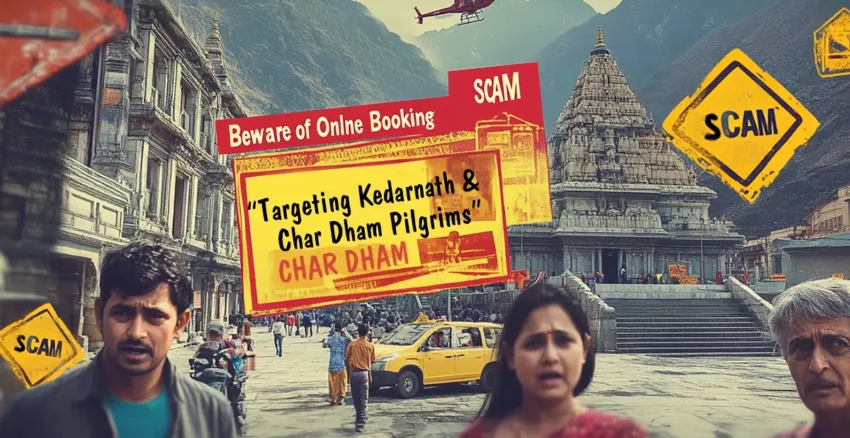Beware! Online Booking Frauds Targeting Kedarnath, Char Dham Pilgrims on the Rise
Fake websites and social media ads are duping Indian devotees and tourists—here’s how to stay safe

As the pilgrimage season picks up and Indian families plan spiritual getaways to places like Kedarnath, Char Dham, and Somnath, cyber fraudsters are sharpening their tricks. The Indian Cyber Crime Coordination Centre (I4C) under the Ministry of Home Affairs has issued a public alert against a new wave of online travel scams, specifically targeting devotees and domestic tourists.
From fake websites to Facebook ads and even sponsored search engine results, these scams are fooling thousands into booking helicopter rides, hotels, guest houses, taxis, and holiday packages — only to vanish after collecting payments.
Devotion Meets Deception: How Indians Are Being Tricked
Imagine a middle-class family from Indore, excited to finally visit Kedarnath after years of planning. They find a “limited-time” helicopter booking offer on Google, click the sponsored link, pay the amount — and then, silence. No tickets. No confirmation. No one answers the call.
Such stories are now alarmingly common. Fraudsters are building professional-looking fake websites, social media pages, and even using WhatsApp numbers to lure people into believing they are legitimate service providers.
What’s Being Offered in These Scams?
Helicopter booking for Kedarnath, Char Dham Yatra
Hotel and guest house bookings for pilgrims
Online cab or taxi bookings to religious places
Discounted holiday packages and spiritual tours
These platforms often mimic real websites or use near-identical names, logos, and content to mislead people into making payments.
What You Should Do to Stay Safe
Here’s how you can protect your loved ones — especially elderly parents and relatives who might fall for such traps:
✅ Only use official websites for bookings. For example:
Kedarnath helicopter bookings: https://www.heliyatra.irctc.co.in
Somnath Trust guest house: https://somnath.org
🚫 Do NOT trust sponsored ads or random Facebook posts offering spiritual tour deals.
🔎 Double-check URLs — even a small spelling mistake can be a red flag.
📞 Call and verify with the service provider before transferring any money.
📢 Report suspicious websites or fraud at www.cybercrime.gov.in or dial 1930.
How the Government Is Cracking Down on These Scams
The Indian Cybercrime Coordination Centre is adopting a multi-layered strategy:
Scam Signal Exchange with platforms like Google, Facebook, WhatsApp for faster takedown of fake accounts.
Enforcement actions in cybercrime hotspots across States and UTs.
Cyber patrolling to proactively identify and block fake websites and social handles.
“Suspect Checking” tools on the Cybercrime Portal now make it easier for citizens to verify suspicious platforms.
Faith is Sacred, So Should Be Safety
In a country like India, where religious tourism is not just a trip but a spiritual journey, such frauds hit deeper — they shake trust, exploit belief, and affect entire families emotionally and financially.
Before you book your next trip for a darshan or holy visit, take a moment to verify. Share this information with your family WhatsApp groups and help someone avoid falling into the trap.
Inflect.in — Your daily dose of stories that inform, inspire, and ignite curiosity. Follow us for more!
Inspire
Latest Post

AI in Healthcare: Smarter, Faster, and Accessible

Is Co-Sleeping Safe for Babies? Pros, Risks,

Pomegranate Benefits: Why Eating Anar or Drinking

Ma Yansong: Shaping the Future of Architecture

AI in Healthcare: Smarter, Faster, and Accessible

Is Co-Sleeping Safe for Babies? Pros, Risks,

Pomegranate Benefits: Why Eating Anar or Drinking








